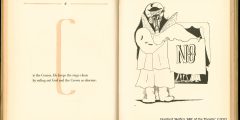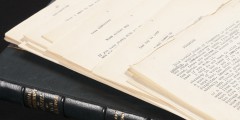What is ‘censorship’?
March 24, 2022
This is a guest post by Gregory Walker, Midlands4Cities Doctoral Student. ‘I would emphasize, first of all, that there is in England no censorship of books’.[1] These were the words of Home Secretary Sir William Joynson-Hicks in the same year (1929) that he seized two typescripts of D. H. Lawrence’s poetry collection, Pansies, in the …
Censorship and Banned Books
January 17, 2019
An auction house in Derbyshire is selling a rare 19th century edition of ‘Fanny Hill – Memoirs of a Woman of Pleasure’ by John Cleland, which was banned not long after its publication in 1748. It’s the story of an orphaned girl who goes to London looking for domestic work and instead ends up working …
Expressing the Unspeakable
November 3, 2015
A version of this post appeared on the University’s LGBT History blog earlier this year. It’s often overlooked compared to Lady Chatterley’s Lover or its sequel Women in Love, but a century ago this month, D H Lawrence’s The Rainbow was the subject of a court case about sex, literature, and censorship. The set-up is typical for a …
Purchasing Pansies: a new addition to the DH Lawrence collections
October 27, 2015
Manuscripts and Special Collections has recently acquired an important original typescript of D.H. Lawrence’s Pansies. The typescript was purchased by the University of Nottingham with assistance from the ACE/V & A Purchase Fund and the Friends of the National Libraries. The title of the volume of poems has nothing to do with the flower of …
Watching Lady Chatterley
September 1, 2015
It’s either surprisingly chaste or shockingly racy, but fifty-five years after being the subject of an obscenity court case, the sexual content of Lady Chatterley’s Lover is once again making the news. The BBC has commissioned a one-off 90 minute version of DH Lawrence’s 1928 novel, which will air on 6th September. The sexual relationship …
Gongster and the ‘Gay News’ poem
February 25, 2015
Since its inception in 1939, The University of Nottingham student newspaper Gongster (now Impact) has often been used as a platform to rally against oppression and censorship, even when the paper itself has come under scrutiny and dictates. In 1978, however, the paper became a victim of censorship itself; in this particular case by their …






